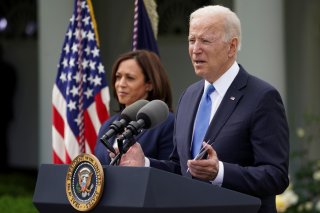Want Another Stimulus Payment? Don’t Look to Congress
The potential end of the distribution of stimulus payments comes as more and more Americans are now demanding that additional payments be made in the future.
Here's What You Need to Remember: Any bill that includes a fourth stimulus payment or recurring stimulus payments is likely to face opposition from both Congressional Republicans and moderate Democrats, such as Joe Manchin (D-WV), who have indicated concern over the budget implications of future payments.
The IRS’ campaign to distribute the third round of direct federal stimulus payments of up to $1,400 looks to be in its final stages. The most recent batch of payments sent out by the IRS was the smallest batch so far, and means that over 85 percent of the funds available for use in stimulus payments have been used up. This batch of payments also indicated that the IRS has now shifted its focus to sending payments to those Americans whose payments are dependent on the processing of their 2020 tax returns.
The potential end of the distribution of stimulus payments comes as more and more Americans are now demanding that additional payments be made in the future. One online petition, which now includes more than two million signatures, has called on Congress to pass legislation that includes a measure for both an additional $2,000 payment to all Americans as well as regular recurring payments for the remainder of the pandemic.
Support for such a plan does exist. In January, a group of Democrats in the House of Representatives, led by Minnesota Representative Ilhan Omar, sent a letter to President Joe Biden and Vice President Kamala Harris calling for recurring stimulus payments. This was followed in March by a letter from 21 Democratic Senators, including Finance Committee Chairman Ron Wyden, again calling on the Biden administration to push for recurring payments.
This advocacy campaign by Congressional Democrats does not appear to have swayed President Biden as of yet. The Biden administration’s two currently proposed tax and spending bills do not include direct stimulus payments, and instead, focus on investments into a number of areas such as education and infrastructure that the administration argues will support long-term economic revival and growth. The White House also indicated recently that the issue of a fourth stimulus payment would be left up to Congress, while also acknowledging that such a measure would be difficult to pay for.
Even with the existing Democratic support for a fourth round of payments, it appears unlikely that such a measure will be passed anytime soon. House Speaker Nancy Pelosi recently announced that generating support for the passing of the Biden administration’s two proposed bills would be a priority, but made no mention of adding additional stimulus payments to them.
Any bill that includes a fourth stimulus payment or recurring stimulus payments is likely to face opposition from both Congressional Republicans and moderate Democrats, such as Joe Manchin (D-WV), who have indicated concern over the budget implications of future payments. For any bill involving additional stimulus payments to pass, it may need to generate support from at least ten Republicans in the Senate in order to prevent the possibility of a filibuster.
Eli Fuhrman is a contributing writer for The National Interest. This article first appeared earlier this year.
Image: Reuters.

